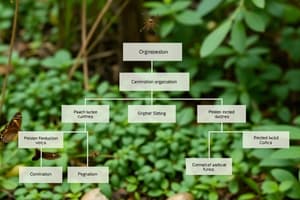Podcast
Questions and Answers
What characteristic is NOT typically shared by living organisms?
What characteristic is NOT typically shared by living organisms?
- Photosynthesis (correct)
- Homeostasis
- Reproduction
- Growth
At which level of biological organization do emergent properties first appear?
At which level of biological organization do emergent properties first appear?
- Organisms
- Tissues
- Molecules
- Cells (correct)
Which of the following best describes the concept of homeostasis?
Which of the following best describes the concept of homeostasis?
- The maintenance of a stable internal environment (correct)
- The exchange of energy between organisms
- The process of genetic information replication
- The ability to adapt to external environmental changes
What is the primary focus of molecular biology?
What is the primary focus of molecular biology?
What process describes how life evolves over millions of years?
What process describes how life evolves over millions of years?
Which branch of biology focuses on the study of heredity and traits?
Which branch of biology focuses on the study of heredity and traits?
What factor is crucial in how organisms interact with their environment?
What factor is crucial in how organisms interact with their environment?
Which of the following statements about ecological studies is accurate?
Which of the following statements about ecological studies is accurate?
Flashcards
What is Biology?
What is Biology?
The study of life and living organisms, including their structure, function, development, evolution, and interactions.
Cell Theory
Cell Theory
The idea that all living things are made up of one or more cells, which are the basic units of life.
Evolution
Evolution
The process by which life on Earth has changed over billions of years, driven by natural selection.
Homeostasis
Homeostasis
Signup and view all the flashcards
Energy Flow
Energy Flow
Signup and view all the flashcards
Genetics
Genetics
Signup and view all the flashcards
Ecology
Ecology
Signup and view all the flashcards
Biochemistry
Biochemistry
Signup and view all the flashcards
Study Notes
Introduction to Biology
- Biology is the natural science that studies life and living organisms, including their physical structure, chemical processes, molecular interactions, physiological mechanisms, development, evolution, and distribution.
- It encompasses a vast range of disciplines, from molecular biology to ecology.
- Living organisms share fundamental characteristics, including organization, growth, reproduction, adaptation, response to stimuli, and homeostasis.
- The study of biology seeks to understand the interconnectedness of all living things and their relationship with the environment.
Levels of Biological Organization
- Biology examines various levels of organization in living things, from atoms and molecules to complex ecosystems.
- The levels include: atoms, molecules, organelles, cells, tissues, organs, organ systems, organisms, populations, communities, ecosystems, and the biosphere.
- Each level builds on the preceding one, with emergent properties arising at each stage.
Key Biological Concepts
- Cell Theory: All living organisms are composed of cells, and cells are the basic units of life.
- Evolution: Life on Earth has evolved over billions of years through a process of natural selection.
- Adaptation: Organisms adapt to their environments over time through natural selection.
- Homeostasis: Organisms maintain a stable internal environment despite external changes.
- Energy Flow: Living organisms obtain and use energy to carry out life processes.
- Information Flow: Genetic information is stored, replicated, and expressed throughout the life cycle of an organism.
- Interdependence: Organisms interact with each other and their environment.
Branches of Biology
- Molecular Biology: Focuses on the structure and function of biological molecules.
- Genetics: Studies the inheritance of traits and the mechanisms of heredity.
- Cell Biology: Explores the structure and function of cells.
- Developmental Biology: Examines the processes of growth and development in organisms.
- Evolutionary Biology: Investigates the evolutionary relationships among organisms and the processes that drive evolution.
- Ecology: Studies the interactions between organisms and their environment.
- Physiology: Investigates how organisms function.
- Biochemistry: Studies the chemical processes within living organisms.
- Botany: Studies plants.
- Zoology: Studies animals.
- Microbiology: Studies microorganisms.
Scientific Method in Biology
- The scientific method is a systematic approach to investigating natural phenomena.
- It involves observation, hypothesis formulation, experimentation, data analysis, and conclusion drawing.
Importance of Studying Biology
- Understanding biological processes is crucial for addressing global challenges such as disease, environmental conservation, and food production.
- Biology provides a foundation for various fields, including medicine, agriculture, biotechnology, and environmental science.
- It helps us understand the diversity of life and our place within the natural world.
Studying That Suits You
Use AI to generate personalized quizzes and flashcards to suit your learning preferences.




